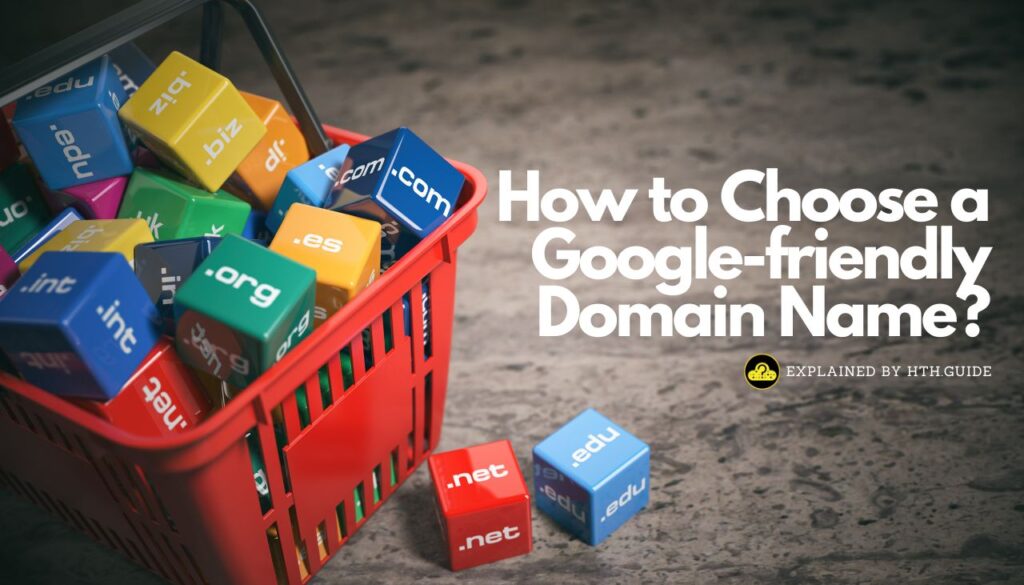On This Page: [hide]
If you are reading this, you want the best domain name that will rank your future website higher in Google and other search engines such as Bing, Yahoo, DuckDuckGo, Yandex, Baidu and the rest. Having a domain name with a strong keyword can work wonders for you right off the bat.
With little planning, SEO tactics and a strategic approach you can be in the top results when people search for the product you want to provide to them. You should be able to pull it off, if you follow the tips we have given in this article.

Choosing the ideal domain name for your website is quite important. That name will symbolize your brand, products, the entity you want to build in the online space you call your own. It is not as easy as it sounds as you have to think smart and ahead. If you want to leave no stone unturned and some sense of direction, this is the right place to start thinking about the perfect Domain Name that is Google-Friendly.
Here are the most crucial tips you will need in choosing the domain name you want, the right way.
Tip 1: .COM Domain Extension Registration
When it comes to the Internet and websites, everybody has heard the extension .COM. Supporting this fact is the multiple uses it has found in culture as well – from keyboards having a “.com” key to characters in TV series having a name of a website with that exact extension as reference.
You might be thinking about being unique and using a crafty and clever extension that is a word – something more catchy and modern. Alas, if you are after big success, the safest extension is “.com”. It is easily recognized among the whole World of Internet users and even if they do not know the extension of a domain, “.com” will be their very first guess. Even if you decide to take up on the challenge of an innovative extension, registering the .com one is always a good idea as it is SEO and Google-friendly. Having it registered, prevents others from snatching it from underneath your feet.
Tip 2: Get More Than One Domain Extension
After you have registered your .com domain name, you should also get some others which are common, such as .net and .biz for businesses. You can redirect a URL to of the other domains to the .com website so visitors who type in some of the other domains can still end up on the correct site.
The market is becoming more and more filled with overlapping names and ideas. So even if you have the “.com” version secured for your desired domain name, somebody might have already registered it with a different extension. So, to avoid confrontation and a worst-case scenario of a competitor beating you in rank and sales, you should check all available names and extensions before making your final decision and buying all popular extensions in one go.
Tip 3: Short and Sweet
As my university lecturers kept repeating that the best approach is to always keep things short and sweet, this rule applies here as well. Your name and slogan should be as short as possible. It will help people remember it better and make it Google-friendly with ease. Especially, if it has a phrase that is commonly used, known or even if you make it rhyme. Easier to fill out in fields of search engines, easier for your clients to share with friends and other people – you are going to do yourself a favor.
Biggest names and most highly sought out ones are one word domains. That is expensive and hard to find, especially for most businesses. That doesn’t mean you should give up – even adding a few words can be just as successful. Have smartphone users in mind, too – what would be easier to type – something short and sweet.
Tip 4: Be Professional and Refrain from Abbreviations
You should really refrain from using shorteners and abbreviations in your domain names as they are unprofessional, harder to memorize. Do not use tricks and cute shortening names as they might seem like a fun, innovative and crafty idea, but they are not. Example: Too Hot For You, should not be labeled as 2hot4U as it is not Google-friendly. Your target audience should be of more diverse people with a bigger age span, and not just teenagers. When it gets down to business, you should be serious.
Tip 5: Be Aware of What to Beware
When it comes to domain names you have to constantly be aware that URLs do not include the spaces between words. Using hyphens in domain names is also not considered okay, partly because it makes a domain longer by having more symbols in it.
Imagine you are a therapist who wants to start a site for colleagues to exchange experience, ideas and stories and you decide the name for the website to be “Therapists Exchange”. Sounds really good so far, but you register the name and the result is “www.therapistsexchange.com” – not exactly what you were going for, right? Be very careful before registering the domain.
Tip 6: Make it Memorable
Memorable domain names are usually short, smart, and avoid humor, hyphens and numbers. If you complicate a domain name too much or make it too long, you run the risk of people forgetting it faster. That can be related to all kinds of branding and advertisements that are currently being displayed across the World in some shape or form.
Some examples include: flyers, newsletters, search queries, and other websites. Thus, thinking ahead and how to make a URL less difficult to be memorized is of crucial importance, not only for people but for gaining higher positions in Google searches. Think of something logical, catchy, something that stands out and could be easier to remember. Maybe even try using something that rhymes or has alliteration in it or just sounds good.
Analyze your top domain name choices and see why they stand out and try to use the same idea about your own domain name.
Tip 7: Make it Brandable
What this means is that when you hear or see the domain name it sounds like a brand that is legitimate and marketable. Just looking at the name, your potential clients should instantly figure out the direction and what your brand might be about. No need to make things literal, but your business and its nature should be clear from the first impression visitors have when they learn about your brand.
Having a domain name such as discounttires.com one would immediately make the association that this website is selling car tires at discounted prices.
So, keep in mind that most established brands are distinguished really fast with just one look at their name. Aim to deliver the service that your name and brand suggest and vice versa and you should be doing well. Using a location or something specific in your domain name should narrow it down and make it unique and quicker to differentiate from competitors. Having said all of that, try to not confuse potential customers as to what your whole business is about.
Tip 8: Stay Away From Trademark Issues
If you have set your heart on a domain name, you now need to devote time to check that name’s history. If the name is new and hasn’t been used before, it is unique and does not rely on an idea from an already existing brand, all should be good. Alas, it often happens that a domain has been left by previous owners because of a bad experience or some negative backlash from the community around it. Google search it and see what comes up as information.
You should make sure that the following criteria are covered: the domain does not have a negative public opinion; does not have words with a double meaning; no trademark issues exist with words in your domain. Nobody wants to register the dream domain name just to find out that there is bad karma that surrounds it, be it negative feedback or copyright infringement.
Social media outlets should also have that same priority of brand analysis. You want to secure social media sites’ handles or to see if previous ones are still available if the name was used in the past. Having brand consistency is also of importance and will ease the search of your clients.
Tip 9: Use Strong Keywords
When you are about to register you domain name, think of a keyword or phrase that is going to help you index your website on the Web better. When searching Internet space, everybody uses keywords to find results related to their query and hopefully find exactly what they seek.
Websites and addresses rely on such keywords, so you should use at least one of them in your domain name. Why? To list your website better in search results and reach a higher position in search engines. You should have a brainstorm session or two to find great keywords that best suit your organization and use them to form a solid branding. Google and other search engines like that and will place your website, blog or web page address higher if you use the right strategy here.
To better describe it, consider the following example: a flower shop, should include keywords, such as flowers, seeds, fertilizer, flowerpot, Roses, Chrysanthemum, tulips, bouquets and the mostly searched for items that your flower shop would sell. A good name formed from some of the keywords could be Tulipsandroses.com or Flowersandbouquets.com. As each search engine works with an algorithm based on keywords when gathering and indexing information, while providing a description of what clients can expect, the above domain names are both equally well suited for the described cause.
Tip 10: Protect your Privacy
There are certain rules that should be kept when you register your domain. You have to give your real and full name, a home or business address, phone number and last but not least, your e-mail address (you should register one if you still haven’t).
After you register a Web domain, your information becomes public knowledge and anyone on the Internet can perform a domain lookup to see the owner of the domain. That makes you more trustworthy in the eyes of your clients, and also shows that you are playing by the book.

 Namecheap
Namecheap

 GoDaddy
GoDaddy

 Bluehost
Bluehost




